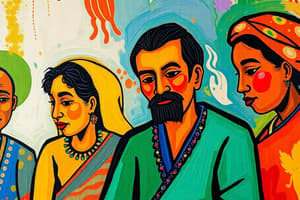Podcast
Questions and Answers
What does cultural heritage refer to?
What does cultural heritage refer to?
- A legacy of physical artifacts and intangible customs passed down through generations (correct)
- The invention of new technologies by younger generations
- The erasure of historical narratives over time
- The modernization of societies in the 21st century
In what way does family tradition influence individuals?
In what way does family tradition influence individuals?
- By encouraging them to erase their histories
- By disconnecting them from societal interactions
- By shaping their collective identity (correct)
- By promoting individualistic behaviors
Which institution helps in preserving material evidence related to cultural heritage?
Which institution helps in preserving material evidence related to cultural heritage?
- Museums and archives (correct)
- Theme parks
- Sports stadiums
- Shopping malls
What was a significant impact of the Great Migration of African Americans in the early 20th century?
What was a significant impact of the Great Migration of African Americans in the early 20th century?
Why is understanding the links between family heritage and tradition important?
Why is understanding the links between family heritage and tradition important?
What do societal norms represent?
What do societal norms represent?
How do traditions evolve over time according to the text?
How do traditions evolve over time according to the text?
What role does sharing family history play in children's development?
What role does sharing family history play in children's development?
How can discussions about challenging family situations benefit children?
How can discussions about challenging family situations benefit children?
What do societal norms refer to according to the text?
What do societal norms refer to according to the text?
How have societal norms about family composition evolved over time?
How have societal norms about family composition evolved over time?
What is the significance of exploring the interconnections between family heritage, cultural traditions, and societal norms?
What is the significance of exploring the interconnections between family heritage, cultural traditions, and societal norms?
Flashcards are hidden until you start studying
Study Notes
Family Heritage and Social Issues: Exploring Cultural Heritage, Traditions, and Societal Norms
Our personal connections to family heritage and tradition shape our perceptions, values, and behavior, often influencing our interactions with society. Understanding these links provides insights into historical narratives and the evolution of socio-political dynamics. Three key concepts intertwine in this exploration: cultural heritage, family traditions, and the nuances of societal norms.
Cultural Heritage
Cultural heritage refers to the legacy of physical artifacts and intangible customs passed down through generations. It shapes our collective identity, offering a lens through which individuals interpret their histories, affiliations, and aspirations. Museums, archives, and oral histories preserve material evidence, allowing us to delve deeper into the human condition across time and space.
For instance, the Great Migration of African Americans from the rural south to urban northern areas in the early 20th century significantly impacted cultural heritage. Urbanization brought new challenges and opportunities, yet it also threatened traditional familial bonds and religious institutions. These shifts highlighted both the adaptability and continuity of cultural legacies amidst significant transformations.
Family Traditions
Tradition encompasses shared rituals, customs, and practices. It serves as a means of transmitting values and fostering cohesion within families and broader kinship networks. While traditions sometimes seem rigid and inflexible, they evolve constantly, accommodating changing social conditions and individual preferences.
Research suggests that sharing family history can enhance children's emotional stability and self-worth. Hearing about ancestors can help children develop a sense of 'intergenerational self', providing them with a connection to their past, which strengthens their identity and resilience. However, explicit discussions about challenging family situations also contribute to children's maturity, preparing them for potential hardships in life.
Societal Norms
Societal norms refer to accepted standards of behavior and belief that govern interpersonal relationships and public conduct. They vary across geographic locations and historical periods, highlighting regional peculiarities and temporal variations.
Consider the shift in familial structures throughout U.S. history. From the traditional nuclear family model emphasizing male breadwinners and homemaker wives to modern variants including single-parent households, blended families, and LGBTQ+ partnerships, societal norms about family composition have evolved dramatically. Similarly, the perception of marriage has transformed, moving from a religious sacrament to a civil contract grounded in love and commitment.
In conclusion, recognizing the symbiotic relationship between family heritage, cultural traditions, and societal norms illuminates the intricate web of influences shaping our daily lives. By exploring these interconnections, we deepen our understanding of personal and collective narratives, enabling us to navigate present realities more effectively.
Studying That Suits You
Use AI to generate personalized quizzes and flashcards to suit your learning preferences.



